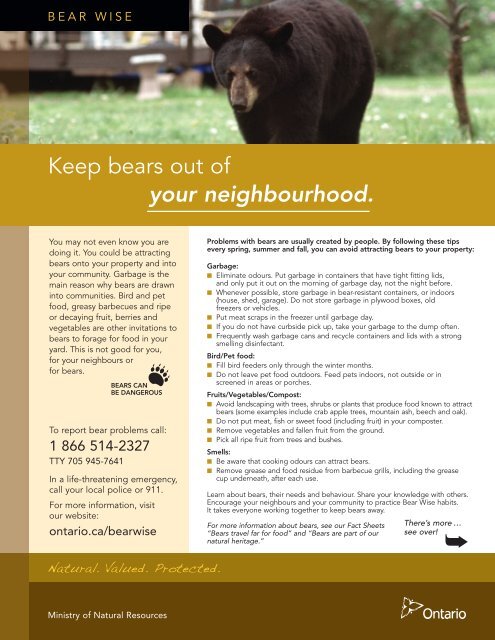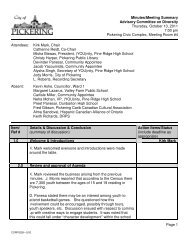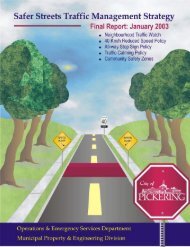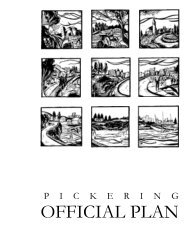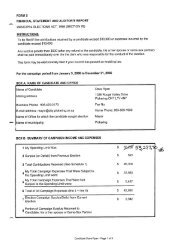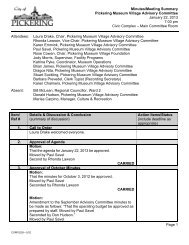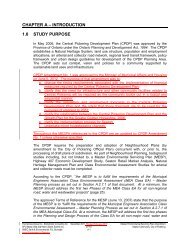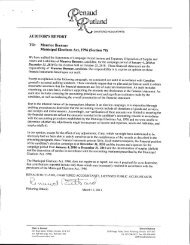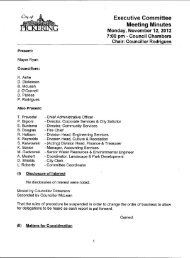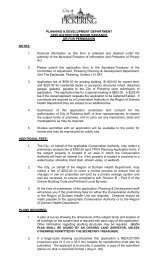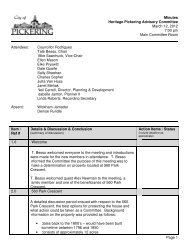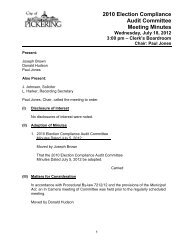Print Version (PDF) - Ministry of Natural Resources - Ontario.ca
Print Version (PDF) - Ministry of Natural Resources - Ontario.ca
Print Version (PDF) - Ministry of Natural Resources - Ontario.ca
Create successful ePaper yourself
Turn your PDF publications into a flip-book with our unique Google optimized e-Paper software.
B E A R W I S E<br />
Keep bears out <strong>of</strong><br />
your neighbourhood.<br />
You may not even know you are<br />
doing it. You could be attracting<br />
bears onto your property and into<br />
your community. Garbage is the<br />
main reason why bears are drawn<br />
into communities. Bird and pet<br />
food, greasy barbecues and ripe<br />
or de<strong>ca</strong>ying fruit, berries and<br />
vegetables are other invitations to<br />
bears to forage for food in your<br />
yard. This is not good for you,<br />
for your neighbours or<br />
for bears.<br />
To report bear problems <strong>ca</strong>ll:<br />
1 866 5142327<br />
TTY 705 9457641<br />
In a lifethreatening emergency,<br />
<strong>ca</strong>ll your lo<strong>ca</strong>l police or 911.<br />
For more information, visit<br />
our website:<br />
ontario.<strong>ca</strong>/bearwise<br />
Na t u r al. Va l u e d . P r o t e c t e d .<br />
Problems with bears are usually created by people. By following these tips<br />
every spring, summer and fall, you <strong>ca</strong>n avoid attracting bears to your property:<br />
Garbage:<br />
• Eliminate odours. Put garbage in containers that have tight fitting lids,<br />
and only put it out on the morning <strong>of</strong> garbage day, not the night before.<br />
• Whenever possible, store garbage in bearresistant containers, or indoors<br />
(house, shed, garage). Do not store garbage in plywood boxes, old<br />
freezers or vehicles.<br />
• Put meat scraps in the freezer until garbage day.<br />
• If you do not have curbside pick up, take your garbage to the dump <strong>of</strong>ten.<br />
• Frequently wash garbage <strong>ca</strong>ns and recycle containers and lids with a strong<br />
smelling disinfectant.<br />
Bird/Pet food:<br />
• Fill bird feeders only through the winter months.<br />
• Do not leave pet food outdoors. Feed pets indoors, not outside or in<br />
screened in areas or porches.<br />
Fruits/Vegetables/Compost:<br />
• Avoid lands<strong>ca</strong>ping with trees, shrubs or plants that produce food known to attract<br />
bears (some examples include crab apple trees, mountain ash, beech and oak).<br />
• Do not put meat, fish or sweet food (including fruit) in your composter.<br />
• Remove vegetables and fallen fruit from the ground.<br />
• Pick all ripe fruit from trees and bushes.<br />
Smells:<br />
• Be aware that cooking odours <strong>ca</strong>n attract bears.<br />
• Remove grease and food residue from barbecue grills, including the grease<br />
cup underneath, after each use.<br />
Learn about bears, their needs and behaviour. Share your knowledge with others.<br />
Encourage your neighbours and your community to practice Bear Wise habits.<br />
It takes everyone working together to keep bears away.<br />
For more information about bears, see our Fact Sheets<br />
“Bears travel far for food” and “Bears are part <strong>of</strong> our<br />
natural heritage.”<br />
There’s more …<br />
see over!<br />
➥<br />
<strong>Ministry</strong> <strong>of</strong> <strong>Natural</strong> <strong>Resources</strong>
B E A R W I S E<br />
What to do if you see<br />
or encounter a bear on your property.<br />
Black bears live mostly in forested<br />
areas where they are best able to<br />
find food, winter den sites and<br />
refuge. With human activity,<br />
development and population<br />
increasing in what we <strong>of</strong>ten <strong>ca</strong>ll<br />
“bear country” or “cottage<br />
country” so too are the possibilities<br />
for people to see or encounter<br />
bears. Knowing what to do if<br />
you see a bear on your property<br />
is being Bear Wise.<br />
To report bear problems <strong>ca</strong>ll:<br />
1 866 5142327<br />
TTY 705 9457641<br />
In a lifethreatening emergency,<br />
<strong>ca</strong>ll your lo<strong>ca</strong>l police or 911.<br />
For more information, visit<br />
our website:<br />
ontario.<strong>ca</strong>/bearwise<br />
Na t u r al. Va l u e d . P r o t e c t e d .<br />
Every encounter with a black bear is unique. The following information is what experts recommend<br />
you do. There is no guarantee that what works in one instance will work in another.<br />
Black Bear safety basics:<br />
• Never approach the bear to get a better look.<br />
• Do not attempt to feed a bear.<br />
• Anticipate and avoid encounters.<br />
• Know what to do if you encounter a bear.<br />
• Learn about bears and their behaviour.<br />
• When outdoors, supervise children and never leave pets unattended.<br />
If you spot a black bear:<br />
• Stay <strong>ca</strong>lm. Often the bear is simply passing through.<br />
• Do not run away. Walk towards a building or vehicle and get inside.<br />
• If you have children and pets, bring them inside too.<br />
• Once indoors, observe the bear. Did it move on or did it stay on your property? If the bear<br />
stayed, what was it doing or eating?<br />
• Encourage the bear to leave. Bang pots and pans, or blow an air horn or whistle. The more<br />
stressful a bear’s encounter with you, the less likely it is to come back.<br />
• If the bear got food (like garbage or bird food), or if the bear tried to get food, you will need to<br />
remove or control the item that attracted the bear.<br />
• Once the bear leaves, remove the attractant and assess your property for other possible attractants<br />
like garbage; dirty barbecue; bird or pet food or fruit or berries from your trees or bushes.<br />
• It is possible for a bear to return even though you removed the attractant. Bears do return to<br />
places where they have found food. Once the bear does not get food, it will move on.<br />
• If you have done everything you <strong>ca</strong>n to remove attractants, and the bear persists, <strong>ca</strong>ll<br />
18665142327.<br />
• If a bear is damaging your property, breaking into your home or threatening your personal safety<br />
or that <strong>of</strong> others, <strong>ca</strong>ll 911 or your lo<strong>ca</strong>l police.<br />
• Alert your neighbours about bear activity, and work together to keep your neighbourhood free<br />
from items that attract bears.<br />
• Work with your municipality to solve problems before they happen.<br />
• If a bear is in a tree, leave it alone. Remove people and dogs from the area. The bear will usually<br />
come down and leave when it feels safe.<br />
NOTE: If you have shot a bear in defense <strong>of</strong> your property, you are required by law to immediately<br />
report it to your lo<strong>ca</strong>l <strong>Ministry</strong> <strong>of</strong> <strong>Natural</strong> <strong>Resources</strong> <strong>of</strong>fice either in person or by telephone.<br />
This requirement applies whether you intend to keep the bear or not. Failure to do so is a violation<br />
<strong>of</strong> the Fish and Wildlife Conservation Act.<br />
To learn more about bear encounters, see our Fact Sheets<br />
“Be safe in bear country” and “What to do if you encounter a bear.”<br />
There’s more …<br />
see over!<br />
➥<br />
<strong>Ministry</strong> <strong>of</strong> <strong>Natural</strong> <strong>Resources</strong>


